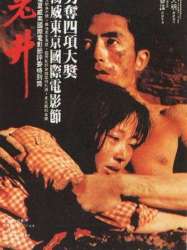Zhang Yimou is a Actor, Director, Scriptwriter, Producer, Director of Photography and Cinematography Chinois born on 2 april 1950 at Xi'an (Chine)

Zhang Yimou ([tʂɑ́ŋ îmɤ̌ʊ̯]) (born 14 November 1951) is a Chinese film director, producer, writer and actor, and former cinematographer. He is counted amongst the Fifth Generation of Chinese filmmakers, having made his directorial debut in 1987 with Red Sorghum.
Zhang has won numerous awards and recognitions, with Best Foreign Film nominations for Ju Dou in 1990 and Raise the Red Lantern in 1991, Silver Lion and Golden Lion prizes at the Venice Film Festival, Grand Jury Prize at the Cannes Film Festival, and the Golden Bear at the Berlin International Film Festival. In 1993, he was a member of the jury at the 43rd Berlin International Film Festival. Zhang directed the opening and closing ceremonies of the 2008 Beijing Summer Olympic Games, which received considerable international acclaim.
One of Zhang's recurrent themes is the resilience of Chinese people in the face of hardship and adversity, a theme which has been explored in such films as, for example, To Live (1994) and Not One Less (1999). His films are particularly noted for their rich use of colour, as can be seen in some of his early films, like Raise the Red Lantern, and in his wuxia films like Hero and House of Flying Daggers. His most recent film is a historical drama war film called The Flowers of War.
À la réouverture de l'Université de cinéma de Pékin en 1978, il tente, à 27 ans, de s'inscrire dans la filière « réalisation » mais il dépasse l'âge limite d'admission. Devant son opiniâtreté, le bureau du Ministère culturel accepte de l'admettre dans la section « prise de vue ». Il sort diplômé de la faculté en 1982, comme Chen Kaige et Tian Zhuangzhuang (eux en « réalisation »). Tous trois sont considérés comme les chefs de file de la « cinquième génération », groupe de cinéastes chinois ayant étudié le cinéma après la Révolution culturelle et qui, influencés par la Nouvelle Vague française , osent revendiquer plus de liberté dans leur création puis évoquer l'héritage maoïste de manière critique.
En tant que directeur de la photographie, il travaille avec Chen Kaige sur ses deux premiers films : Terre jaune et La Grande Parade.
En 1987, il réalise son premier long métrage Le Sorgho rouge (adaptation du Clan du sorgho de Mo Yan) qui remporte l'Ours d'or au Festival de Berlin en 1988.
L'actrice Gong Li, avec qui il a une liaison jusqu'en 1995, joue dans ses sept premiers longs métrages et tourne à nouveau sous sa direction dans la shakesperienne Cité interdite en 2006.
Zhang Yimou réalise de nombreux films importants, pour la plupart des fresques marquées par la grande beauté des images et par la critique sous-jacente des modèles historiques chinois (la féodalité impériale, la Révolution culturelle, la République de Deng Xiaoping...). Judou, Épouses et concubines (adaptation d'un roman de Su Tong), Qiu Ju, une femme chinoise (adaptation d'une nouvelle de Chen Yuanbin) et Vivre ! (adaptation d'un roman de Yu Hua) le font connaître en Occident et lui permettent de gagner de nombreux prix dans les festivals internationaux, même s'il rencontre fréquemment des ennuis avec la censure.
Ses films se caractérisent également par une esthétique exotique, propre à émerveiller les spectateurs par la magnificence des décors et des costumes. Ils dénotent un soin minutieux apporté à la composition des cadres, la mise en espace des personnages et au rythme narratif, souvent lent et posé.
Voguant sur le renouveau du wu xia pian, lancé par Tigre et Dragon, il réalise Hero où les plus grandes stars du cinéma de Hong Kong sont réunies : Jet Li, Maggie Cheung, Tony Leung Chiu-wai, Zhang Ziyi et Donnie Yen. Le film qui est un succès international, est loué pour le travail du directeur de la photographie Christopher Doyle sur l'utilisation des couleurs, mais certains critiques occidentaux lui reprochent son sous-texte idéologique justifiant le totalitarisme pour assurer la stabilité de l'empire. Il s'agit d'un tournant dans la carrière du cinéaste qui délaisse le cinéma d'auteur pour s'inscrire dans le grand spectacle mâtiné d'effets spéciaux avec ensuite Le Secret des poignards volants et La Cité interdite. On a alors accusé Zhang Yimou de délaisser le cinéma contestataire pour devenir le réalisateur officiel de la RPC.
Il réalise également, pour la ville de Yangshuo, un spectacle musical, son et lumière, Impression, Liu Sanjie, avec 600 participants, chanteurs et danseurs, en plein air, sur une partie de la rivière, dans le décor naturel des collines karstiques. Le spectacle, passage obligé pour tous les touristes, depuis 2003, valorise les paysages, les populations, particulièrement les pêcheurs, les groupes féminins et le folklore local. D'autres Impression(s) ont suivi.
Lors de la Mostra de Venise 2007 il est le président du jury des longs-métrages. Son jury est particulièrement brillant avec Catherine Breillat, Jane Campion, Emanuele Crialese, Alejandro González Iñárritu, Ferzan Özpetek et Paul Verhoeven.
Il est choisi pour concevoir le spectacle de la cérémonie d'ouverture des Jeux olympiques d'été de 2008 à Pékin. Il succède à Steven Spielberg à ce poste, après le retrait de ce dernier (pour protester contre le non-respect des droits de l'homme dans ce pays et contre l'implication du régime de Pékin dans la guerre civile au Darfour).
En 2009, il a réalisé A Woman, a Gun and a Noodle Shop qui est le remake de Sang pour sang des frères Coen.
En décembre 2013, un scandale national éclate en Chine lorsqu'on apprend que Zhang Yimou a eu trois enfants avec sa femme. La loi n'autorisait qu'un enfant unique depuis les années 1980 et commençait à s'ouvrir à un deuxième enfant. Il est de ce fait condamné à une lourde amende. Son film Coming Home, pressenti pour représenter la Chine aux Oscars, est finalement retiré.
Son film One Second est retiré de la compétition pour l'Ours d'or lors du 69e Festival de Berlin, quelques jours seulement avant sa présentation.
Source : Wikidata
Zhang Yimou

- Infos
- Photos
- Best films
- Family
- Characters
- Awards
Zhang has won numerous awards and recognitions, with Best Foreign Film nominations for Ju Dou in 1990 and Raise the Red Lantern in 1991, Silver Lion and Golden Lion prizes at the Venice Film Festival, Grand Jury Prize at the Cannes Film Festival, and the Golden Bear at the Berlin International Film Festival. In 1993, he was a member of the jury at the 43rd Berlin International Film Festival. Zhang directed the opening and closing ceremonies of the 2008 Beijing Summer Olympic Games, which received considerable international acclaim.
One of Zhang's recurrent themes is the resilience of Chinese people in the face of hardship and adversity, a theme which has been explored in such films as, for example, To Live (1994) and Not One Less (1999). His films are particularly noted for their rich use of colour, as can be seen in some of his early films, like Raise the Red Lantern, and in his wuxia films like Hero and House of Flying Daggers. His most recent film is a historical drama war film called The Flowers of War.
Biography
Zhang Yimou est issu d'une famille proche du Kuomintang. Son père a combattu avec le grade de major dans l'armée nationaliste et son oncle a fui à Taïwan avec Tchang Kaï-chek après la défaite contre les communistes lors de la guerre civile chinoise, en 1949. À partir de la Révolution culturelle en 1966, Zhang Yimou, contraint d'arrêter ses études, part travailler trois ans dans une ferme puis sept ans dans un atelier de tissage. Durant cette période, il poursuit une activité de peintre et de photographe amateur.À la réouverture de l'Université de cinéma de Pékin en 1978, il tente, à 27 ans, de s'inscrire dans la filière « réalisation » mais il dépasse l'âge limite d'admission. Devant son opiniâtreté, le bureau du Ministère culturel accepte de l'admettre dans la section « prise de vue ». Il sort diplômé de la faculté en 1982, comme Chen Kaige et Tian Zhuangzhuang (eux en « réalisation »). Tous trois sont considérés comme les chefs de file de la « cinquième génération », groupe de cinéastes chinois ayant étudié le cinéma après la Révolution culturelle et qui, influencés par la Nouvelle Vague française , osent revendiquer plus de liberté dans leur création puis évoquer l'héritage maoïste de manière critique.
En tant que directeur de la photographie, il travaille avec Chen Kaige sur ses deux premiers films : Terre jaune et La Grande Parade.
En 1987, il réalise son premier long métrage Le Sorgho rouge (adaptation du Clan du sorgho de Mo Yan) qui remporte l'Ours d'or au Festival de Berlin en 1988.
L'actrice Gong Li, avec qui il a une liaison jusqu'en 1995, joue dans ses sept premiers longs métrages et tourne à nouveau sous sa direction dans la shakesperienne Cité interdite en 2006.
Zhang Yimou réalise de nombreux films importants, pour la plupart des fresques marquées par la grande beauté des images et par la critique sous-jacente des modèles historiques chinois (la féodalité impériale, la Révolution culturelle, la République de Deng Xiaoping...). Judou, Épouses et concubines (adaptation d'un roman de Su Tong), Qiu Ju, une femme chinoise (adaptation d'une nouvelle de Chen Yuanbin) et Vivre ! (adaptation d'un roman de Yu Hua) le font connaître en Occident et lui permettent de gagner de nombreux prix dans les festivals internationaux, même s'il rencontre fréquemment des ennuis avec la censure.
Ses films se caractérisent également par une esthétique exotique, propre à émerveiller les spectateurs par la magnificence des décors et des costumes. Ils dénotent un soin minutieux apporté à la composition des cadres, la mise en espace des personnages et au rythme narratif, souvent lent et posé.
Voguant sur le renouveau du wu xia pian, lancé par Tigre et Dragon, il réalise Hero où les plus grandes stars du cinéma de Hong Kong sont réunies : Jet Li, Maggie Cheung, Tony Leung Chiu-wai, Zhang Ziyi et Donnie Yen. Le film qui est un succès international, est loué pour le travail du directeur de la photographie Christopher Doyle sur l'utilisation des couleurs, mais certains critiques occidentaux lui reprochent son sous-texte idéologique justifiant le totalitarisme pour assurer la stabilité de l'empire. Il s'agit d'un tournant dans la carrière du cinéaste qui délaisse le cinéma d'auteur pour s'inscrire dans le grand spectacle mâtiné d'effets spéciaux avec ensuite Le Secret des poignards volants et La Cité interdite. On a alors accusé Zhang Yimou de délaisser le cinéma contestataire pour devenir le réalisateur officiel de la RPC.
Il réalise également, pour la ville de Yangshuo, un spectacle musical, son et lumière, Impression, Liu Sanjie, avec 600 participants, chanteurs et danseurs, en plein air, sur une partie de la rivière, dans le décor naturel des collines karstiques. Le spectacle, passage obligé pour tous les touristes, depuis 2003, valorise les paysages, les populations, particulièrement les pêcheurs, les groupes féminins et le folklore local. D'autres Impression(s) ont suivi.
Lors de la Mostra de Venise 2007 il est le président du jury des longs-métrages. Son jury est particulièrement brillant avec Catherine Breillat, Jane Campion, Emanuele Crialese, Alejandro González Iñárritu, Ferzan Özpetek et Paul Verhoeven.
Il est choisi pour concevoir le spectacle de la cérémonie d'ouverture des Jeux olympiques d'été de 2008 à Pékin. Il succède à Steven Spielberg à ce poste, après le retrait de ce dernier (pour protester contre le non-respect des droits de l'homme dans ce pays et contre l'implication du régime de Pékin dans la guerre civile au Darfour).
En 2009, il a réalisé A Woman, a Gun and a Noodle Shop qui est le remake de Sang pour sang des frères Coen.
En décembre 2013, un scandale national éclate en Chine lorsqu'on apprend que Zhang Yimou a eu trois enfants avec sa femme. La loi n'autorisait qu'un enfant unique depuis les années 1980 et commençait à s'ouvrir à un deuxième enfant. Il est de ce fait condamné à une lourde amende. Son film Coming Home, pressenti pour représenter la Chine aux Oscars, est finalement retiré.
Son film One Second est retiré de la compétition pour l'Ours d'or lors du 69e Festival de Berlin, quelques jours seulement avant sa présentation.
Best films
Usually with
Filmography of Zhang Yimou (32 films)
Actor
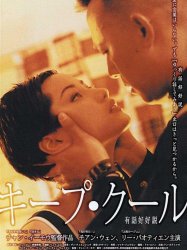
Keep Cool (1997)
, 1h30Directed by Zhang Yimou
Genres Drama, Comedy
Actors Jiang Wen, Li Baotian, Zhao Benshan, Zhang Yimou, Fu Biao
Roles Poet Reader
Rating71%





The film is set in contemporaneous Beijing. It begins with bookseller Zhao Xiaoshuai (Jiang Wen) who is following his ex-lover An Hong (Qu Ying) home, obviously after an unhappy and one-sided break-up. He tracks the fast-walking An Hong on a bus and later on a bicycle, until she reaches her flat and goes up to her apartment. There, Zhao gets a junk peddler (Zhang Yimou, the director himself, speaking in his native Shaanxi accent) and another peddler to call out her name and declare his undying love to her at the high-rise flats.

Lumière and Company (1995)
, 1h28Directed by Gabriel Axel, Cédric Klapisch, Patrice Leconte, Claude Lelouch, Abbas Kiarostami, Andreï Kontchalovski, Youssef Chahine, Liv Ullmann, Wim Wenders, Costa-Gavras, Jacques Rivette, Theo Angelopoulos, Alain Corneau, Michael Haneke, Claude Miller, John Boorman, David Lynch, Francis Girod, Merzak Allouache, James Ivory, Spike Lee, Arthur Penn, Jerry Schatzberg, Jaco Van Dormael, Peter Greenaway, Gaston Kaboré, Idrissa Ouédraogo, Bigas Luna, Zhang Yimou, Régis Wargnier, Yoshishige Yoshida, Lucian Pintilie, Lasse Hallström, Helma Sanders-Brahms, Nadine Trintignant, Raymond Depardon, Vicente Aranda, Fernando Trueba, Ismail Merchant, Hugh Hudson
Origin Danemark
Genres Drama, Comedy, Documentary, Action
Actors Isabelle Huppert, Romane Bohringer, Bruno Ganz, Géraldine Pailhas, Ticky Holgado, Zinedine Soualem
Roles lui-même
Rating68%





40 réalisateurs ont tourné 52 secondes de leur choix sans son et en trois prises maximum avec la caméra originelle des frères Lumière.
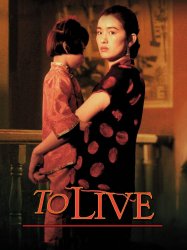
To Live (1994)
, 2h5Directed by Zhang Yimou
Origin Hong kong
Genres Drama, War, Romance
Themes Films about families, Political films
Actors Gong Li, Niu Ben, Guo Tao, Zhang Yimou
Roles 导演
Rating82%





In the 1940s. Xu Fugui (Ge You) is a rich man's son and compulsive gambler, who loses his family property to a man named Long'er. His behaviour also causes his long-suffering wife Jiazhen (Gong Li) to leave him, along with their daughter, Fengxia and their unborn son, Youqing.
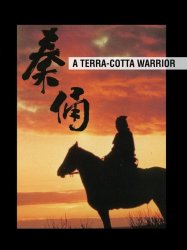
A Terra-Cotta Warrior (1989)
, 2h25Directed by Ching Siu-tung
Origin Hong kong
Genres Drama, Comedy, Fantasy, Adventure, Historical, Romance
Themes Sports films, Martial arts films, Wuxia films
Actors Zhang Yimou, Gong Li, Yu Rongguang, Wu Tianming
Roles General Meng Tianfang
Rating66%





The First Emperor searches for the elixir of immortality, and he despatches 500 teenage boys and girls to help him accomplish this task. One of his soldiers, General Meng Tianfang falls in love with one of the despatched maiden by the name Dong'er. When their forbidden love is exposed, the girl reveals she has found the elusive elixir and secretly gives it to Meng. The emperor orders their execution and the soldier is sentenced to death by being encased alive in clay as a terracotta warrior, only to be reawakened in the 1930s when a struggling actress, Zhu Lili, the reincarnation of the girl who remembers nothing of her past life, accidentally stumbles upon the tomb of the First Emperor. The soldier struggles to adapt to a new era while the two are pursued by archeological looters and thugs.

Red Sorghum (1988)
, 1h31Directed by Zhang Yimou
Genres Drama, War, Historical, Romance
Themes Films about music and musicians, Musiques du monde, Musical films, Political films
Actors Gong Li, Jiang Wen, Zhang Yimou
Rating72%





The film takes place in a rural village in China's eastern province of Shandong during the Second Sino-Japanese War. It is narrated from the point of view of the protagonist’s grandson, who reminisces about his grandmother, Jiu'er (S: 九儿, T: 九兒, P: Jiǔ'ér). She was a poor girl who was sent by her parents into a pre-arranged marriage with an old man, Li Datou, who owns a distillery.
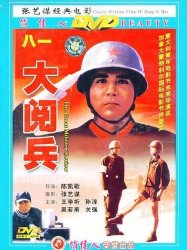
The Big Parade (1986)
, 1h43Directed by Chen Kaige
Genres Drama
Actors Wang Xueqi, Zhang Yimou
Rating59%





Six soldats de l'armée de l'air suivent un entraînement particulièrement difficile en vue de participer au défilé militaire de la fête nationale chinoise.
Director
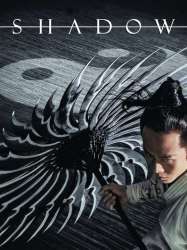
Shadow (2018)
Directed by Zhang Yimou
Origin Chine
Genres Drama, Action
Actors Betty Sun, Deng Chao, Hu Jun
Rating69%





L’histoire d’un grand roi et de son peuple chassés de leur patrie et aspirant à la reconquérir. Le roi est violent et ambitieux, mais ses motivations et ses méthodes sont mystérieuses. Son général est un visionnaire qui désire ardemment gagner la bataille finale, mais a besoin de préparer ses plans en secret. Les femmes du palais luttent pour trouver la rédemption dans un monde où elles n’ont pas de place. Et puis il y a un roturier, le «Monsieur-tout-le-monde» autour duquel tournent les forces inexorables de l’histoire, toujours prêtes à l’engloutir.
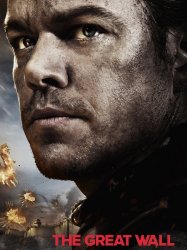
The Great Wall (2016)
, 1h43Directed by Zhang Yimou
Origin USA
Genres Thriller, Fantastic, Fantasy, Action, Adventure
Themes Kaiju films, Giant monster films, Disaster films
Actors Matt Damon, Willem Dafoe, Zhang Ziyi, Andy Lau, Henry Cavill, Jing Tian
Rating59%





Set in Northern Song Dynasty, the story is about mysteries revolving around the Great Wall of China.

Lady of the Dynasty (2015)
Directed by Tian Zhuangzhuang, Zhang Yimou
Genres War, Historical, Romance
Actors Fàn Bīngbīng (范冰冰), Leon Lai, Joan Chen, Shun Oguri, Sam Voutas, Wen Zhang
Rating42%






Coming Home (2014)
, 1h49Directed by Zhang Yimou
Origin Chine
Genres Drama, Romance
Themes Politique, Political films
Actors Gong Li, Guo Tao, Zhang Huiwen, Liu Peiqi, Zu Feng, Ding Jiali
Rating71%





The story is adapted from the novel, The Criminal Lu Yanshi (陆犯焉识; 陸犯焉識) written by novelist Geling Yan. Lu Yanshi (陆焉识; 陸焉識, "Yanshi" literally means "how to recognize") was a professor before being sent to the labor camp (laogai, literally "reform through labor") during the Cultural Revolution. He escaped from the labor camp in Xining to meet his long-missed wife Feng Wanyu (冯婉瑜; 馮婉瑜) and daughter Dandan (Chinese: 丹丹). However, the police were already waiting outside the house to arrest him. Dandan, who was then a teenage ballerina, could not play the leading role in Red Detachment of Women due to her father's outlaw status. Under the temptation of regaining the leading role, Dandan revealed her parents' secret meeting plan to the police. The meeting ended with the capture of Lu and Dandan getting the supporting role. After the end of the Cultural Revolution, Lu came home only to find his broken family, his wife suffering from amnesia and his daughter working as textile worker. Under the shock of a former official's sexual harassment, his wife sometimes recognized him as Officer "Fang" instead of being her husband. To reawaken his wife's memory, Lu played out as a total stranger just to be near with his wife. Although she recognized him as a letter reader or a piano tuner, he never could be able to be close enough to live with his chaste wife. During these years, Lu continued to write to his wife as a way of communicating with her, and to convince his wife to forgive their daughter. The movie ended with Feng waiting to receive her husband outside the railway station and Lu standing with her on a snowy day, pretending to be pedicab driver.

The Flowers of War (2011)
, 2h25Directed by Zhang Yimou
Origin Chine
Genres Drama, War, Historical, Romance
Themes Political films
Actors Christian Bale, Ni Ni, Shigeo Kobayashi, Paul Schneider, Junichi Kajioka
Rating74%





In 1937, Japan invades China, beginning the Second Sino-Japanese War. The Japanese Imperial Army overruns China's capital city, Nanking, in December and carries out the systematic and brutal Nanking massacre.

Under the Hawthorn Tree (2010)
, 1h54Directed by Zhang Yimou
Origin Chine
Genres Drama, Romance
Themes Political films
Actors Zhou Dongyu, Lü Liping, Sun Haiying
Rating71%





Set during the end of China's Cultural Revolution in a small village in Yichang City, Hubei Province, China, this film is about a pure love that develops between a beautiful high school student, Zhang Jing Qiu and a handsome young prospector named Lao San. Jing Qiu is one of the "educated youth" sent to be "re-educated" through work in the countryside under a directive from Chairman Mao Zedong.
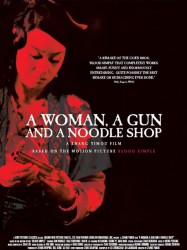 , 1h35
, 1h35Directed by Zhang Yimou
Origin Chine
Genres Drama, Thriller, Comedy, Comedy-drama
Actors Sun Honglei, Zhao Benshan
Rating56%





This script must be run from the command line

To Each His Own Cinema (2007)
, 1h40Directed by Claude Lelouch, Abbas Kiarostami, Amos Gitaï, Elia Suleiman, Nanni Moretti, Takeshi Kitano, Andreï Kontchalovski, Youssef Chahine, Roman Polanski, Wim Wenders, Chen Kaige, Raoul Ruiz, Olivier Assayas, Theo Angelopoulos, Michael Cimino, Wong Kar-wai, Manoel de Oliveira, Jane Campion, Alejandro González Iñárritu, David Lynch, Gus Van Sant, Atom Egoyan, Lars von Trier, Ken Loach, Walter Salles, David Cronenberg, Zhang Yimou, Bille August, Aki Kaurismäki, Hou Hsiao-hsien, Tsai Ming-liang, Raymond Depardon
Origin France
Genres Drama, Comedy
Actors Isabelle Adjani, Anouk Aimée, Antoine Chappey, David Cronenberg, Yosra El Lozy, Taraneh Allidousti
Rating67%





35 réalisateurs d'origines très variées (25 pays différents) ont tous mis en scène un court métrage de 3 minutes, sur le thème de la salle de cinéma. Le film en regroupe 33 puisque les frères Coen et les frères Dardenne travaillent ensemble. Celui de David Lynch ne faisait pas partie du film mais a été présenté en ouverture du festival.
 Connection
Connection








